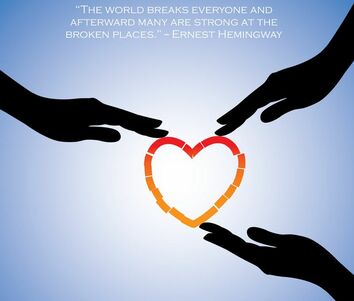Yet sometimes all we know is that we feel anxious or have a vague sense of discomfort. We might ruminate or obsess about things but still feel in the dark about the root of our upset. One way I was taught self-understanding and soothing is via a type of psychotherapy called AEDP (Accelerated Experiential Dynamic Psychotherapy). AEDP uses the change triangle to promote awareness/calm places. This is helpful as a therapist, but it can also be helpful to everyone.
This change triangle is based on the image of an upside-down triangle. The top of this triangle has two sides. One side represents defenses. The other represents what is called inhibitory emotions such as anxiety, shame and guilt. These defenses are what stop us from feeling our true, core emotions. In general, we have five primary emotions: FEAR, JOY, ANGER, SADNESS and DISGUST. These are universal and shared with all humans. In our daily lives, it can be a necessary survival strategy to avoid the “core five”. However, that avoidance can also force us to disown important, deeper parts of ourselves. The point of this upside-down triangle is to access these core feelings. I read an exemplary story of a young woman who called her Dad to tell him about a job promotion, expecting an enthusiastic and supportive response, only to then receive a detached, “Oh, that’s nice”. She hung up with her Dad and felt very anxious, as she had always wanted validation from her father yet was protective of him simultaneously. She felt confused and anxious and said to herself, “It’s not a big deal”. That statement kept her in defense and her anxiety kept her at the top of the triangle, not understanding what was really going on for her. If she were to slow down and check in with her sensations, she might realize that her core feeling was ANGER. If she stayed with this ANGER for a bit, she may have prevented herself from self-denigrating, for instance, but realize what she really needed: positive reinforcement from her Dad. She could do a number of things with this; she could confront him and express herself, she could realize that she is OK and might eventually come to accept that her father cannot give her what she needs at times. She may arrive at various adaptive conclusions. But first she needed to feel her core emotion of ANGER. It is the first step in her eventual acceptance and confidence, of mastery of herself. The case above exemplifies how understanding your "core" emotions or "gut feeling" can give rise to a sense of clarity. This clarity will help you to make decisions, help you to be in control of what you need to say and do and feel more confident. Getting in touch with these core feelings allows for a sense of "mastery”. Mastery? Yes, mastery. Mastery by definition relates to having a profound sense of skill or accomplishment. This accomplishment is not of a skill or career, but of yourSelf! This Self with a capital "S" has qualities that is peaceful, calm and can bring about a sense of wholeness and fullness in us that is almost a spiritual nature. It arises by first courageously staying with and understanding our core feelings/emotions. While at times this can be painful, "the only way through is through"! So how do we get to our core emotions and find clarity? I’ve created a list of my recommendations on how to start your own therapy and aid in your journey of self-discovery! This might be handy when you don’t have the opportunity to talk with someone directly.
This is just one way of getting to understand yourself and make sense of distressing feelings. It is also a way of self-healing. I suggest trying it on your own. Remember, with the help of a loved one or a caring therapist you can work through this in relationships as well. This process can bring us closer to each other as human beings. In couple’s therapy it is said, one of the most important skills to learn is not just learning communication tools, but being able to be vulnerable with each other. Inner dialogues with yourself, and with others, can be so useful in honoring our humanity. Mr. Rogers of PBS Fame used his TV show to help children realize, honour and understand their feelings and not to be afraid to express emotions without holding them in. This is just as important for adults and also what therapy is good for: to provide space not only to bring self-clarity but to share your feelings with another. Mr. Rogers is famous for stating, "If you could mention it [your feelings], you can manage it!" Comments are closed.
|
Categories
All
Archives
March 2023
|
[email protected]


 RSS Feed
RSS Feed